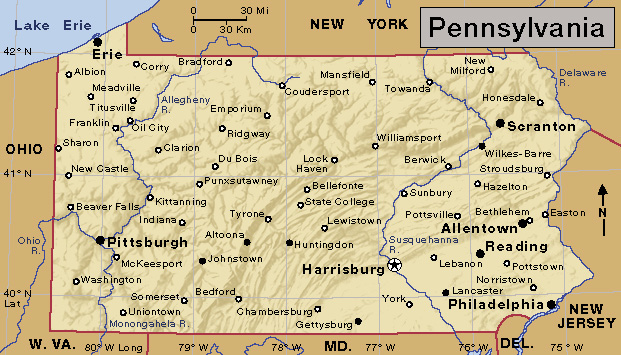Harrisburg (pop. 50,099; met. area pop. 591,712) is the capital of Pennsylvania. The city lies along the Susquehanna River, in the south-central part of the state. Harrisburg is the seat of Dauphin County. It has a mayor-council type of government.

The state government is Harrisburg’s largest employer. The area’s manufactured products include candy and other food products and computer parts. Harrisburg has been a transportation center since the days of riverboat traffic. Today, the Pennsylvania Turnpike skirts the city, and other highways surround Harrisburg. Airlines use Harrisburg International Airport, and passenger trains and rail freight lines serve the city. A large agricultural exhibition is held in Harrisburg each January.
The Pennsylvania State Capitol dome rises 272 feet (83 meters) above the city. Statues by the American sculptor George Grey Barnard flank the Capitol’s entrance. Harrisburg is the home of the National Civil War Museum. The city’s institutions of higher education include campuses of Pennsylvania State and Temple universities; Harrisburg University of Science and Technology; and the Dixon University Center, which serves as an adult education center and the headquarters of the 14-university Pennsylvania State System of Higher Education.

John Harris, Sr., operated a ferry at Harrisburg in colonial days. His son John laid out the town of Harrisburg in 1785 and gave land to the Pennsylvania commonwealth that was later used for the Capitol grounds. The city became the state capital in 1812. It was a defense center during World War II (1939-1945). In 1972, Hurricane Agnes caused severe flooding in Harrisburg. In the late 1900’s, revitalization efforts included new construction in the downtown area and the development of a recreation center on City Island in the Susquehanna River.
In October 2011, Harrisburg’s huge debt prompted its city council to file for bankruptcy protection. The city had sold municipal bonds to finance an expansion of its incinerator, which burned waste to produce electricity. The incinerator was not profitable enough to cover the bond payments, and the city was unable to pay its bills. In November, a judge ruled that the council did not have the power to file for bankruptcy. The state of Pennsylvania then placed Harrisburg under receivership status, taking control of the city’s finances. Harrisburg exited state receivership in 2014 after the city’s financial condition improved.
